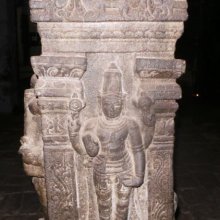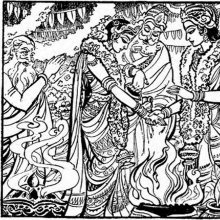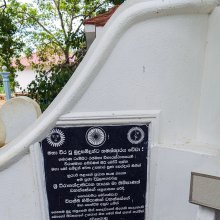Veta, Veṭa, Vēṭa: 11 definitions
Introduction:
Veta means something in Hinduism, Sanskrit, the history of ancient India, Marathi, biology, Tamil. If you want to know the exact meaning, history, etymology or English translation of this term then check out the descriptions on this page. Add your comment or reference to a book if you want to contribute to this summary article.
Images (photo gallery)
(+8 more images available)
India history and geography
Source: Cologne Digital Sanskrit Dictionaries: Indian Epigraphical GlossaryVĕṭa.—(IE 8-4), same as vĕṇṭhĕ, etc. Note: vĕṭa is defined in the “Indian epigraphical glossary” as it can be found on ancient inscriptions commonly written in Sanskrit, Prakrit or Dravidian languages.
Source: Institut Français de Pondichéry: The Shaivite legends of KanchipuramVētā (வேதா) (in Tamil) refers to Vedhas (Brahman), and represents one of the proper nouns mentioned in the Kanchipuranam, which narrates the Shaivite Legends of Kanchipuram—an ancient and sacred district in Tamil Nadu (India). The Kanchipuranam (mentioning Vētā) reminds us that Kanchipuram represents an important seat of Hinduism where Vaishnavism and Shaivism have co-existed since ancient times.

The history of India traces the identification of countries, villages, towns and other regions of India, as well as mythology, zoology, royal dynasties, rulers, tribes, local festivities and traditions and regional languages. Ancient India enjoyed religious freedom and encourages the path of Dharma, a concept common to Buddhism, Hinduism, and Jainism.
Biology (plants and animals)
Source: Wisdom Library: Local Names of Plants and DrugsVeta [वेत] in the Konkani language is the name of a plant identified with Calamus thwaitesii Becc. from the Arecaceae (Palm) family. For the possible medicinal usage of veta, you can check this page for potential sources and references, although be aware that any some or none of the side-effects may not be mentioned here, wether they be harmful or beneficial to health.
Veta [वेत] in the Marathi language, ibid. previous identification.
Veta [वेत] in the Konkani language is the name of a plant identified with Calamus pseudotenuis Becc. from the Arecaceae (Palm) family having the following synonyms: Calamus pseudo-tenuis ?.
Veta [वेत] in the Marathi language, ibid. previous identification.

This sections includes definitions from the five kingdoms of living things: Animals, Plants, Fungi, Protists and Monera. It will include both the official binomial nomenclature (scientific names usually in Latin) as well as regional spellings and variants.
Languages of India and abroad
Marathi-English dictionary
Source: DDSA: The Molesworth Marathi and English Dictionaryvēṭa (वेट) [or वेंट, vēṇṭa].—m f (vēṣṭana S) A twist or band (of straw, grass, fibres, flexile shoots &c., and, freely, of cloth and other things). 2 fig. A contortion of the bowels (in the gripes or in the yearning of tenderness). v uṭha, vaḷa, yē, phira, piḷa; as pōṭācā or bēmbīcā vēṭa vaḷalā-piḷalā &c. 3 A roll or turn (around anything) of a rope. 4 A rope (i. e. a twist of three strands) esp. of ambāḍī. 5 The name of a creeping plant. vēṭa vaḷaṇēṃ g. of s. To agree together; to be of one mind; to band or confederate. 2 To crowd and press one upon another tumultuously; to fall together in crowds, heaps, masses. Ex. phaujēcā tyā kilyāvara mōṭhā vēṭa vaḷalā; gurāñcā musaḷavādyānēṃ ēka vēṭa vaḷalā.
--- OR ---
vēta (वेत).—m (vētasa S) Ratan, Calamus rotang or verus. 2 A ratan or cane. 3 Cable-ratan, Calamus rudentium.
--- OR ---
vēta (वेत).—n (viṇēṃ) Littering or bringing forth: also a litter, brood, birth: also a turn or an occasion of littering.
Source: DDSA: The Aryabhusan school dictionary, Marathi-Englishvēṭa (वेट) [-ṭha, -ठ].—m f A twist (of grass, &c.). A contortion of the bowels. A roll (around anything) of a rope.
--- OR ---
vēta (वेत).—m Ratan; a cane. n Littering or bringing forth.
Marathi is an Indo-European language having over 70 million native speakers people in (predominantly) Maharashtra India. Marathi, like many other Indo-Aryan languages, evolved from early forms of Prakrit, which itself is a subset of Sanskrit, one of the most ancient languages of the world.
Sanskrit dictionary
Source: DDSA: The practical Sanskrit-English dictionaryVeta (वेत).—A cane, reed.
Derivable forms: vetaḥ (वेतः).
Source: Cologne Digital Sanskrit Dictionaries: Shabda-Sagara Sanskrit-English DictionaryVeṭā (वेटा).—f.
(-ṭā) The abode of the Vaiśya tribe.
Source: Cologne Digital Sanskrit Dictionaries: Monier-Williams Sanskrit-English Dictionary1) Veṭa (वेट):—m. a kind of tree (= pīlu-vṝkṣa), [Gaṇaratna-mahodadhi]
2) Veṭā (वेटा):—[from veṭa] f. the abode of the Vaiśya tribe (?), [Horace H. Wilson]
3) Veta (वेत):—m. ([probably] corrupted [from] vetra; but See, [Uṇādi-sūtra iii, 118]) a cane, reed, [cf. Lexicographers, esp. such as amarasiṃha, halāyudha, hemacandra, etc.]
4) Vetā (वेता):—[from veta] f. = vetana, [cf. Lexicographers, esp. such as amarasiṃha, halāyudha, hemacandra, etc.]
Source: Cologne Digital Sanskrit Dictionaries: Yates Sanskrit-English DictionaryVeṭā (वेटा):—(ṭā) 1. f. The abode of the Vaisya tribe.
[Sanskrit to German]
Sanskrit, also spelled संस्कृतम् (saṃskṛtam), is an ancient language of India commonly seen as the grandmother of the Indo-European language family (even English!). Closely allied with Prakrit and Pali, Sanskrit is more exhaustive in both grammar and terms and has the most extensive collection of literature in the world, greatly surpassing its sister-languages Greek and Latin.
Tamil dictionary
Source: DDSA: University of Madras: Tamil LexiconVētā (வேதா) noun < vēdhas.
1. Brahmā; பிரமன். (பிங்கலகண்டு) வேதா நாயகற் குரைக்கலுற்றான் [piraman. (pingalagandu) vetha nayagar kuraikkalurran] (கந்தபு. திருக்கல். [kanthapu. thirukkal.] 76).
2. God; கடவுள். [kadavul.] (W.)
3. Sun; சூரியன். (யாழ்ப்பாணத்து மானிப்பாயகராதி) [suriyan. (yazhppanathu manippayagarathi)]
Tamil is an ancient language of India from the Dravidian family spoken by roughly 250 million people mainly in southern India and Sri Lanka.
See also (Relevant definitions)
Starts with (+188): Veta-vakkiyacorupam, Veta-vetaenal, Vetabba, Vetacankitai, Vetacannam, Vetacaram, Vetacariyar, Vetacastiram, Vetacastiri, Vetacatci, Vetacceri, Vetacci, Vetada, Vetagra, Vetai, Vetaiccinturam, Vetaikkalam, Vetaikkanipputu, Vetaikkayiru, Vetaipporuttam.
Ends with (+31): Abhyaveta, Amdashveta, Amlaveta, Anatishveta, Anaveta, Anyangashveta, Aryashveta, Asamaveta, Aveta, Avyaveta, Bhusaveta, Canora Veta, Canora-veta, Cataveta, Cauveta, Citrakah-sveta, Duveta, Kanneveta, Kaveta, Kiviveta.
Full-text (+17343): Veda, Vedha, Vedhas, Vedokta, Rigveda, Shruti, Vedas, Vedanga, Triveda, Vedaparaga, Brahmaveda, Brahmayajna, Vaidika, Svadhyaya, Vedajna, Vedavid, Vedanta, Brahmana, Caturvidya, Vedashastra.
Relevant text
Search found 332 books and stories containing Veta, Vaethaa, Veda, Vedha, Vĕṭa, Veṭa, Vĕta, Vēta, Vēṭa, Veṭā, Vetā, Vētā, Vetha, Vethaa; (plurals include: Vetas, Vaethaas, Vedas, Vedhas, Vĕṭas, Veṭas, Vĕtas, Vētas, Vēṭas, Veṭās, Vetās, Vētās, Vethas, Vethaas). You can also click to the full overview containing English textual excerpts. Below are direct links for the most relevant articles:
Tiruvaymoli (Thiruvaimozhi): English translation (by S. Satyamurthi Ayyangar)
Pasuram 4.2.3 < [Section 2 - Second Tiruvaymoli (Palan ay, El ulaku untu)]
Pasuram 1.6.2 < [Section 6 - Sixth Tiruvaymoli (Parivatu il icanai)]
Vastu-shastra (3): House Architecture (by D. N. Shukla)
Chapter 7 - The Principal Components
Chapter 10 - The Defects of the House
Chapter 5 - Planning of Śālās: The House Plans and Building Byelaws
The Bhagavata Purana (by G. V. Tagare)
Chapter 11 - The concept of Time: Manvantaras and life-spans of Men and Gods < [Book 3 - Third Skandha]
Chapter 4 - Arrival of Nārada < [Book 1 - First Skandha]
Chapter 6(b) - Classification of Vedas in Different Branches < [Book 12 - Twelfth Skandha]
Rig Veda (translation and commentary) (by H. H. Wilson)
The Linga Purana (by J. L. Shastri)
Chapter 18 - Viṣṇu’s praise of Śiva (viṣṇustava) < [Section 1 - Uttarabhāga]
Chapter 39 - Specific Dharmas of Four Yugas < [Section 1 - Uttarabhāga]
Chapter 103 - The glory of Śakti (pārvatī-vivāha) < [Section 1 - Uttarabhāga]
A Vedic Conception of the Poet < [May-June 1933]
Veda in Ramayana < [October - December 1975]
Hindu Rituals and their significance < [January – March, 1998]
Related products
(+21 more products available)










